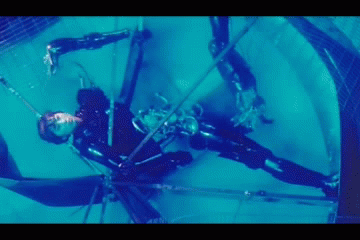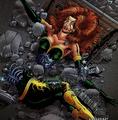Damage: Difference between revisions
Jump to navigation
Jump to search
mNo edit summary |
mNo edit summary |
||
| Line 1: | Line 1: | ||
{| class="wikitable" align="right" style="text-align:center" border="1" style="width:10%" | {| class="wikitable" align="right" style="text-align:center" border="1" style="width:10%" | ||
| [[Image:I Love Maria damage scene 1.gif]] The titular character from | | [[Image:I Love Maria damage scene 1.gif]] The titular character from the movie ''[[Gallery/I Love Maria|I Love Maria]]'' is damaged. | ||
|} | |} | ||
'''Damage''' refers to a fembot being physically harmed or injured in any form or degree of severity, which frequently involves exposition of her mechanical nature. This can go from minor harm such as a tear in the skin, to missing parts or complete obliteration. | '''Damage''' refers to a fembot being physically harmed or injured in any form or degree of severity, which frequently involves exposition of her mechanical nature. This can go from minor harm such as a tear in the skin, to missing parts or complete obliteration. | ||
Damage is often preceded, accompanied or followed by [[Malfunction|malfunctions]]. Malfunctions | Damage is often preceded, accompanied or followed by [[Malfunction|malfunctions]]. While Malfunctions also fall outside of the fembot's normal operation, they do not result in visible physical harm. [[Disassembly]] is different from damage by virtue of the fembot being taken apart following design specifications, as opposed to violent action. | ||
==In fiction== | ==In fiction== | ||
Revision as of 09:29, 27 October 2019
 The titular character from the movie I Love Maria is damaged. The titular character from the movie I Love Maria is damaged.
|
Damage refers to a fembot being physically harmed or injured in any form or degree of severity, which frequently involves exposition of her mechanical nature. This can go from minor harm such as a tear in the skin, to missing parts or complete obliteration.
Damage is often preceded, accompanied or followed by malfunctions. While Malfunctions also fall outside of the fembot's normal operation, they do not result in visible physical harm. Disassembly is different from damage by virtue of the fembot being taken apart following design specifications, as opposed to violent action.
In fiction
Damage to a fembot is often the plot device used to reveal her mechanical nature to the audience of a work.
- In the pilot of Terminator: The Sarah Connor Chronicles, Cameron suffers multiple gunshot wounds. Her endoskeleton is revealed near her collarbone as she removes the bullets.
- During the climax of Terminator 3: Rise of the Machines, the T-X is stripped of some of her polymimetic coating when she is trapped by a massive electromagnet. Later, she is completely bisected when a helicopter is crashed into her. Her upper body continues to crawl across the hangar, intent on completing her mission, until she is finally destroyed.
- In the horror movie Jason X, Kay-em 14 is decapitated by the mighty slasher. This injury is not as grievous as one might expect; for the remainder of the movie her disembodied head looks around, makes wisecracks, and controls computer systems.
More examples
-
Animated
-
Animated
-
Animated
-
Animated
-
Animated
-
Animated
-
Animated













